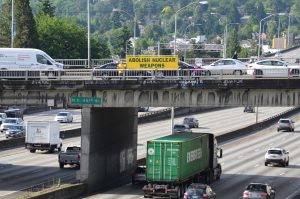Resisting nuclear build-up at the ballot box—or in the street
Citizens of Washington State consistently vote for government officials who support building and stationing nuclear weapons in our state. In the 1970s, Senator Henry Jackson convinced the Pentagon to locate the Trident submarine base on Hood Canal. Senator Warren Magnuson obtained funding for roads and other consequences of building the base there. Since 2012, with the establishment of the Washington Military Alliance (WMA), our elected officials have tried even harder to promote Washington as a place to expand military investment, including in nuclear weapons.

We are a target and a threat
But even though we have voted for candidates willing to spend ever greater amounts of our tax money on an ever-expanding nuclear arsenal—few of us are aware of the reality. Naval Base Kitsap-Bangor, just 20 miles west of Seattle, is homeport to the largest concentration of deployed nuclear warheads in the US. The nuclear warheads are deployed on Trident D-5 missiles on SSBN submarines and are stored in an underground nuclear weapons storage facility on the base.
People at Ground Zero Center for Nonviolent Action are trying to make us aware of this. Beginning June 7, they will be holding banners over Interstate 5, on the NE 45th overcrossing, with messages to commuters stressing the imperative to Abolish Nuclear Weapons. They’ll be there every Monday between 8:00 and 9:00 all summer.
At a time when a new Cold War, involving not only the US and Russia, but also China, is heating up, the bannering is intended to remind citizens of Puget Sound to accept their role and responsibility—as taxpayers, as members of a democratic society and as neighbors to the Trident nuclear submarine base in Hood Canal—to work to prevent the use of nuclear weapons.
Busy buying more weapons despite the pandemic
The International Campaign to Abolish Nuclear Weapons, or ICAN, just published a report revealing that global spending on nuclear weapons increased by $1.4 billion last year despite the pandemic. The United States spent by far the most—$37 billion—three times more than the next country, China, which spent $10 billion. All told, the world’s nine nuclear-armed countries spent $72.6 billion on nuclear weapons in 2020—that amounts to nearly $138,000 every minute.
The report features a few of the 20 companies that produce these weapons. Boeing, of course; and Raytheon, Northrop Grumman, Honeywell International and on and on. Another report, this one by the Congressional Budget Office, found that over a 10-year period, the embedded cost for US nukes would be $140 billion higher than the same 10-year projection in 2019.
Biden follows in Trump’s footsteps despite his claim to differ
Biden campaigned for limits on nuclear arms; and for diplomacy to replace nuclear threats. But as President, Biden has continued Trump initiatives to expand the US nuclear arsenal. In his new budget, Biden is seeking $43 billion for nuclear weapons, including money to develop a new submarine-launched nuclear cruise missile. (As a candidate, he described this as a “bad idea.”) The Trump administration withdrew from a key arms control pact (Open Skies)—and Biden decided not to re-enter it.
Running on “change,” governing on more of the same
Here is the limit to the proposition that the ballot is the guarantor of representative government. It turns out that the ballot can be rendered meaningless by entrenched money that commands ever more of our resources for bullets—a $1.25 trillion “national security” budget devoted to building and deploying weapons. Candidates run for office on statements that play to the public’s desire for change—and then govern on behalf of the corporate leaders who bankroll their campaigns—and pour money into local economies based on manufacturing more new weapons.
Spending tax money to get more tax money
After the nine nuclear powers decided in 2020 to spend $72.6 billion on their nuclear weapons, they gave out over $27 billion in contracts to the companies that build and maintain these weapons. These companies spend money to make sure that they keep getting money in years to come. They spent over $117 million lobbying policymakers to increase spending on defense, and another $10 million funding major think tanks that research and write about nuclear weapons.
An era of mass protests and treaties limiting nuclear weapons
Evidently, it takes more than voting. The 1970s and ‘80s saw the emergence of mass movements demanding an end to testing, production and deployment of nuclear weapons. At Bangor, thousands demonstrated against nuclear weapons and hundreds were arrested. The Nuclear Freeze Campaign swept across the US, attracting the support of peace groups and mainstream religious, professional and labor organizations. The largest protest was held on June 12, 1982, when one million people demonstrated in New York City. (Surprised? Read a report here: www.armscontrol.org/blog/2018-06-10/fight-continues.)
In this period, the US and Russia signed several treaties promising to limit and scale back the production and deployment of nuclear weapons. In recent years, however, awareness of the spread of nuclear arms has diminished even as the investment in nuclear weaponry has grown exponentially and governments have reverted to plans for their use. In the absence of organized public opposition, the US is pumping money into new nuclear technologies—and playing wargames that envision their use.
The Ground Zero Center for Nonviolent Action was founded in 1977. The center is on 3.8 acres adjoining the Trident submarine base at Bangor, Washington. Ground Zero offers the opportunity to explore the roots of violence and injustice in our world and to experience the transforming power of love through nonviolent direct action. We resist all nuclear weapons, especially the Trident ballistic missile system. Contact: Leonard Eiger (360) 375-3207, outreach@gzcenter.org

Be First to Comment